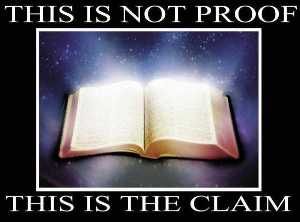I came across this the other day, on The official blog of University of Missouri Skeptics, Atheists, Secular Humanists, & Agnostics

A half truth
I couldn’t resist replying, in part:
Nice and simple, but like many nice and simple things, only a half truth. And of course a half truth misrepresents the other half of the truth.
For the Bible is both evidence and a claim.
The Bible consists of many documents. Historians have examined those documents and come to conclusions, some of which are fairly much agreed upon. They find some parts to be probably historically inaccurate, and other parts to be probably historically accurate – and that means just as accurate as other ancient history.
Thus the Bible contains good historical evidence – not all of it, but sufficient parts of it to be useful. And that means it is evidence.
Then of course it also becomes a claim. But a claim based on the historical evidence, not on nothing.
Evidence and faith
Sceptics often accuse christians of having faith without evidence, and I suppose this must sometimes be true. (Though since christian faith is based on Jesus and the gospels, and these is good historical evidence for the basic facts outlined in the gospels – see Jesus in history – this charge will not generally be absolutely true.) But I am clearly seeing “faith-based” behaviour on the part of some atheists, especially young ones on the internet, who bely their professed rationalism by ignoring the facts established by experts (e.g. about Jesus) and by misrepresenting christian belief (e.g. about faith).
It is sometimes true to say about some people on either side of the debate:
We have seen the enemy and it is us.
Read some more about these issues
If you are interested, I have considered these matters in more detail:
- How we can know something is true, including belief in God, in Truth, proof and certainty.
- Are the sceptics right about faith, in Is faith the opposite of reason?
- The sceptics say it’s so, but Is there no evidence for God?
“(Though since christian faith is based on Jesus and the gospels, and these is good historical evidence for the basic facts outlined in the gospel”
Really? Which facts would these be, precisely?
I would be extremely interested to read your reply.
The “facts” are outlined in one of the links I gave – Jesus in history. I often do blog posts that way to keep the length down – summarise the main point and then refer back to a more detailed discussion. Sorry if you didn’t realise that.
What you have outlined are not facts – merely points of view.
There are no facts currently available to establish whether Jesus was an actual person. None.
Even the ‘experts’ are only speculating on what evidence they have at hand. Namely: The Bible and a few secular references to Christians.
“What you have outlined are not facts – merely points of view.
There are no facts currently available to establish whether Jesus was an actual person. None.”
The facts are quite clear:
1. There are references to Jesus in many sources, many close enough to his life to make them historically useful.
2. Scholars who are used to assessing these facts tell us that if they use the same methods as they use for other historical figures, they can only conclude that Jesus existed.
Those are factual statements.
If you wish to deny the conclusion that Jesus existed, which is a conclusion and not a fact, you must either:
(i) Say the scholars are wrong despite all their experience, or
(ii) decide you will not judge Jesus according to normal historical approaches.
I wonder which of these, or some other alternative, you choose?
“There are references to Jesus in many sources, many close enough to his life to make them historically useful.”
Sorry, forgot about this and didn’t mean to be rude by not replying. It ties in with our current discussion as well.
At the risk of being pedantic, could you qualify this statement by listing the ‘many sources’ & ‘many close enough’ that mention Jesus, or Yashua, if you prefer?
I’m sure you know the sources as well as I do –
If we take completed documents as sources, we have 4 gospels, Acts, Paul’s letters, other NT letters, Josephus, Tacitus. If we take the scholars’ reconstructions of basic sources, we have something like: Mark, Q, M, L, several sources in John, some early creeds quoted by Paul, etc. This is a lot by historical standards.
Closeness refers to the gap between the events and the time of writing the sources. In the case of the NT, it is within a few years for some of the creeds, within less than a generation for Paul’s writings and well within living memory for some of the gospels. This is quite short by historical standards.
“I’m sure you know the sources as well as I do -”
Indeed I do.